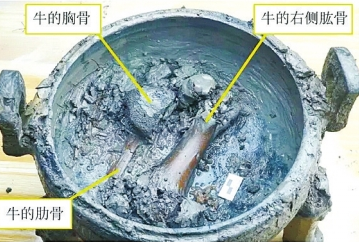(单词翻译:单击)
A pot of 2,000-year-old beef soup has been unearthed in Central China - one of many ancient dishes discovered by archaeologists who proved that after two millennia, some foods haven't changed.
最近在华中地区出土了一鼎2000多年的牛肉汤--这是考古学家们挖掘出的多种食物之一,并且在2000多年过后,其中一些食品仍然保持原样。
The cauldron containing meat and bone fragments was excavated last Thursday at a site in present-day Henan Province that dates back to the Warring States period (1042BC-223BC).
这个装有骨头和碎肉的鼎于上周四被挖掘出土,地点位于今天河南省的一个考古点,可以追溯到战国时期(公元前1042-223年)。
The bones were identified as those of oxen, which led experts to believe they had stumbled pot of beef soup, according to Sina Weibo account "Henan Archaeology".
据新浪微博账号“河南考古”表示,这些骨头经确认为牛骨,这使得专家们确信他们发现的是一鼎牛肉汤。
The specific location of the tomb site or the identity of its owner was not revealed for security reasons, the post read.
出于安全原因,该微博并没有透露古墓的确切地点和墓主人的身份。

According to ancient Chinese custom, deceased nobility were often buried with portions of their favorite foods to enjoy in the afterlife.
根据中国古代习俗,去世的贵族往往和他们最喜爱的食物埋在一起,从而供他们来世享用。
Back in 1972, a similar pot of lotus root soup from the Han Dynasty (206BC-AD220) was excavated at the Mawangdui Tombs in Central China's Hunan Province, Beijing Evening News reported in March.
《北京晚报》曾于今年三月份报道,早在1972年也有过类似的事件,当时在湖南马王堆汉(公元前206年-公元220年)墓挖掘出了一鼎莲藕汤。
A Tang Dynasty (618-907) tomb in Turpan, Northwest China's Xinjiang Uygur Autonomous Region yielded remains of dumplings.
而在新疆吐鲁番的一座唐代(公元618-907年)古墓中,也挖掘出了一些饺子。


